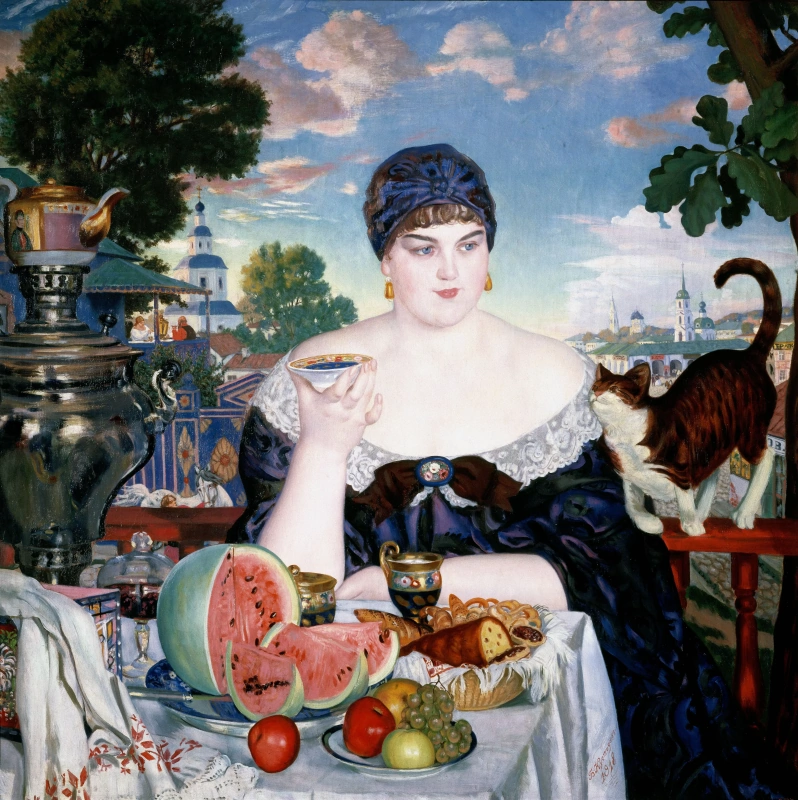log in
Enter site
Login to use Arthive functionality to the maximum
Merchant's wife at tea
Boris Kustodiev • Painting, 1918, 120×120 cm


















Description of the artwork «Merchant's wife at tea»
In 1918, when it was written "Merchant's wife at tea"euphoria, which Kustodiev experienced in connection with the revolution, came to naught. It was a cursed days: hunger, poverty, doubt. Wife Kustodiev – Julia – went on Sunday to cut wood, pay her, like other laborers, - wood. Boris Mikhailovich took – in voluntary-a compulsory order, improvement or decoration of Petrograd on the occasion of the revolutionary anniversary. In a letter to theatre Director Vasily Luzhsky Kustodiev wrote: "We live here it does not matter, cold and hungry, everyone is talking around about the food and the bread... I sit at home and, of course, work and work, that's all our news. Have stockbase according to people in the theatre for the music - all I denied".
Knowing these circumstances, it is not easy to accept at face value the "Merchant's wife at tea", with all its meat and dairy hedonism, causing a physicality and sweet calm.
Contemporaries Kustodiev found it a bitter irony. Especially conscious gave the picture a satirical tone: it seemed to them that Kustodiyev – now Soviet artist drew a caricature of the merchant class, a kind of lady Macbeth of Mtsensk. Only after decades it became evident that this painting is one of the most personal Kustodiev. And, of course, the artist painted it without figs in the pocket.
From a number of typical contracts Kustodiev (1, 2, 3) this is highlighted by the fact that is in some way a portrait of the "imaginary friend" - the Motherland, which Kustodiev lost, but violently, desperately, painfully remembered.
Hot mirror samovar does not reflect the revolutionary fires. Salvos of the Aurora is not profane midday bliss – hear just how on the next balcony interfere with the silver spoon tea. Just gently swaying corporal hills. In heavenly eyes, no hint of the idea of ravishing Russian Zen. No, it's not the Troika that is rushing somewhere, not listening to reason and not seeing the road. This is Russia, where the time to drink tea. Where are you now, give me the answer. Is not the answer.
Author: Andrew Zimoglyadov
Knowing these circumstances, it is not easy to accept at face value the "Merchant's wife at tea", with all its meat and dairy hedonism, causing a physicality and sweet calm.
Contemporaries Kustodiev found it a bitter irony. Especially conscious gave the picture a satirical tone: it seemed to them that Kustodiyev – now Soviet artist drew a caricature of the merchant class, a kind of lady Macbeth of Mtsensk. Only after decades it became evident that this painting is one of the most personal Kustodiev. And, of course, the artist painted it without figs in the pocket.
From a number of typical contracts Kustodiev (1, 2, 3) this is highlighted by the fact that is in some way a portrait of the "imaginary friend" - the Motherland, which Kustodiev lost, but violently, desperately, painfully remembered.
Hot mirror samovar does not reflect the revolutionary fires. Salvos of the Aurora is not profane midday bliss – hear just how on the next balcony interfere with the silver spoon tea. Just gently swaying corporal hills. In heavenly eyes, no hint of the idea of ravishing Russian Zen. No, it's not the Troika that is rushing somewhere, not listening to reason and not seeing the road. This is Russia, where the time to drink tea. Where are you now, give me the answer. Is not the answer.
Author: Andrew Zimoglyadov
Recommended artworks:























